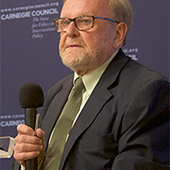It all began so auspiciously in U.S. and Western eyes—the "Color Revolutions" that would constitute the final step from authoritarian to democratic governance by states that had endured almost 50 years of the Soviet yoke.
Beginning in Georgia in 2003, with the "Rose Revolution" election of the West-oriented Mikhail Saakashvili (after the Soviet Foreign Minister holdover Shevardnadze and the ultranationalist Gamsakhurdia); followed in successive years by the similarly democratically credentialed Viktor Yushchenko in Ukraine in the "Orange revolution" against the regime of Viktor Yanukovych, seen as a corrupt, pro-Moscow puppet; and then the "Tulip revolution" that overthrew the autocratic Askar Akayev in Kyrgyzstan. Revolutions indeed, of gentle hues and fragrances, for the most part nonviolent, and all the more welcome in that in each case they were the result of popular protest in the streets of Tbilisi, Kiev, and Bishkek against elections that were widely viewed as fraudulent.
A mere few years on, the bloom is most definitely off the Rose—and the Orange and the Tulip too. The only one of the three "Color Revolution" victors to have survived is Saakashvili in Georgia, and he shakily so, and with growing opposition following the reckless adventurism of the war with Russia in 2008 over the breakaway Georgian province of South Ossetia. As for the others, the reversal is complete, with Yushchenko consigned to the rubbish heap of history following a 2009 election humiliation in which, as incumbent, he drew single-digit support at the polls (all the more bitter as the loss was to his despised adversary, Yanukovych). The situation in Kyrgyzstan is most dire, with a second "interim President" in five years trying to stem a tide of interethnic violence that threatened to plunge the small, impoverished Central Asian state into all-out civil war.
What happened? In a word, a combination of excessive expectations of "Color Revolution" leaders who have most decidedly proved wanting, and some strategic policy missteps and overreach, primarily at the hands of the United States and the West.
What is the fallout? They vary, in inverse proportion to the size and strategic importance of the state in question.
Ukraine
In Ukraine, the largest and most consequential—the international relations scholar Sherman Garnett once described Ukraine as the "keystone in the arch" of Eurasian security—the tawdry legacy of the Orange Revolution has basically been five years of wasted time and opportunity, the squandering of an agenda that seemed to serve the strategic interests of both Ukraine and the West:"[to] reform Ukraine's notoriously corrupt government, improve the economy, and reorient the country toward Europe and away from Russia," as the Council on Foreign Relation's Lionel Beehner described it in 2004.
Barely one year later, President Viktor Yushchenko, who came to power in the second round of elections after the October 2004 vote was judged to be invalid, had fired his entire cabinet in a miasma of graft and corruption, had overseen economic growth fall from 12 percent in 2004 to 4 percent in 2005, and had embarked on an internecine feud with his fellow "democrat" and iron lady of post-Cold War Ukrainian politics, Prime Minister, Yulia Tymoshenko. In the years since, to the extent that Ukraine has appeared on the radar screen of the West, it has been in the flirtation with NATO membership (an issue on which the country is deeply divided, as it is on the general question of orientation toward Russia or the West) and in the resulting spats with Moscow, primarily over the price that Kiev pays for Russian natural gas.
In this, Russia has been accused of using the gas supply to Ukraine as a pressure point in dissuading its neighbor from westward inclinations—a view that seems odd, to say the least. From Moscow's vantage point, one might well ask why gas should have continued to flow at well-below-market prices to a client that was overtly seeking membership in an alliance that is not invariably seen as positively inclined toward Russia. Two recent developments are relevant here: first, the new government of Viktor Yanukovych negotiated a quid pro quo arrangement with Russia over gas prices on the one hand, and a long-term extension of the bilateral agreement over the Russian Black Sea naval fleet based in Sebastopol in the Crimean peninsula—an arrangement immediately denounced in the West as a capitulation on the part of Kiev, but one that the people of Ukraine will most certainly see differently in the throes of winter. Second, as if to demonstrate that the fair-price setting policy for gas is not targeted solely at a recalcitrant Ukraine, Russia has similarly served notice to Belarus on the issue.
One final and regrettable note in the political obituary of the leader of the Orange Revolution: in the aftermath of his defeat, Yushchenko went out of his way to honor Stepan Bandera, the World War II-era ultrnationalist and Nazi collaborator, as a "Hero of Ukraine."
Georgia
With respect to Georgia, the situation was more complex and multilayered. With its strategic location between the oil-rich Caspian Sea and the Black Sea, the small South Caucasus state offered for the West an ideal fuel transit option, in that it avoided both Russia and Iran. Thus, for the U.S.-blessed "democrat" of Georgian vintage, President Mikhail Saakashvili, from Baku via Tbilisi to the Turkish port of Ceyla was "nothing less than a revival of the Old Silk Road"—the Great Game revisited, with energy as the stake. It was a stake high enough for President George W. Bush, on November 2003, to throw his support to, and offer, if necessary, to intervene in defense of Georgia's "sovereignty, independence, and territorial integrity"—a gauntlet directed at Russia, and a reference to separatist forces in the historically rebellious provinces of Abkhazia and South Ossetia (the latter of which had challenged Georgian rule for almost a century, and which would do so again in the Georgia-Russia war of 2008).
Saakashvili, mayor of Tbilisi and a protégé of the ousted President (and former Soviet Foreign Minister) Edouard Shevardnadze, came to power, like Yushchenko in Ukraine, as a result of public outcry over an election perceived as fraudulent. The backing of the United States was immediate and overt, from the President's statement quoted above and the prompt visit by Secretary of Defense Donald Rumsfeld to Tbilisi in early December 2003.1
The use of Georgia as a pawn in the strategic chess game with Russia has continued into the Obama administration. There is a "he said, she said" debate over who fired the first salvo in the 2008 conflict over South Ossetia, but clearly Saakashvili, a nationalist committed to "winning back" South Ossetia and Abkhazia, felt sufficiently emboldened by U.S. and Western support to indulge in what The Financial Times described at the time as "reckless overbidding." And it was in Tbilisi that Vice President Joe Biden chose to make his dismissive remarks on Russia's "waning" economic and military capacities.
The bottom line for Georgia is that the endgame prize of the Rose Revolution—NATO membership—has been shelved indefinitely, a victim of the chronic and debilitating civil conflicts that the actions of August 2008 served to reignite.
Kyrgyzstan
For the small, remote, mountainous Central Asian republic of Kyrgyzstan, the stakes are highest, indeed potentially tragic. There has now been a second putsch, following the overthrow of Akayev in March 2005, and the potential cost to the Kyrgyz is all-out civil war. The unrest in the capital, Bishkek, that accompanied the April 2010 ouster of Akayev's successor, Kurmanbek Bakiyev, has spread alarmingly to the south of the country, a veritable tinder box of interethnic tensions. This area, part of the Ferghana Valley, an impoverished region where Kyrgyzstan, Tajikistan, and Uzbekistan converge, has been "the dog that has not barked" since the end of the Cold War. Pundits predicted violence along the lines of that in Nagorno-Karabakh, between ethnic Azeris and Armenians, and other hotspots in the former Soviet space. In 2005, Central Asian expert Martha Brill Olcott noted with relief in the turbulent transition from Akayev to Bakiyev:
"Public order has held in the southern part of the country's densely populated region with a history of interethnic violence."
Not so now; by mid-June more than 100 had been killed around Osh, in southern Kyrgyzstan, and home to a large Uzbek minority population. Most alarmingly, the Uzbek victims of the attacks have accused Kyrgyz nationalist forces as having been behind the attacks, with the connivance, or even participation, of the Kyrgyz police and military. Nor will it take much for the violence to deepen and spread.
Kyrgyzstan's geographic location make it a transit point in the narcotics trade route from Afghanistan into Russia and beyond into Europe. But herein lies an opportunity for the United States, its Western allies, and Russia to move beyond competition and confrontation to engagement for mutual benefit. There is already a recognition on both sides of Kyrgyzstan's strategic position: for the United States, it is home to the Manas base that serves operations in Afghanistan; for Russia, it is a key sentry post to guard against instability spreading northward from Afghanistan (and also in the efforts to stem the drug traffic). Thus, Kyrgyzstan is unique in having both an American and Russian military base presence on its soil.
This commonality of interest and purpose may offer the opportunity for U.S.-Russia cooperation, perhaps, as James Collins and Matthew Riojansky recently suggested ("Kyrgyzstan: A Test for Mutual Security," International Herald Tribune, June 15, 2010), working through various multilateral organizations involved in Central Asia. They suggest NATO, the Organization for Security and Cooperation in Europe [OSCE], and the Collective Security Treaty Organization (an alliance of seven former Soviet states).
NATO's role in the post-Soviet space may raise some issues and, in any event, the bona fides of OSCE in conflict resolution are certainly more credible. In any case, to the list of contributing regional forces one ought to add the Shanghai Cooperation Organization [SCO]—first, because Kyrgyzstan, along with three other central Asian states, is a member; second, because Russia and China are also members, and each clearly has a compelling interest in the security of a shared extended region; and third, because the stated mission of SCO is "to fight regional insecurity" and to resolve destabilizing border and interethnic disputes within its sphere of interest.
The Kyrgyz crisis offers, therefore, the opportunity to redress two decades of zero-sum dealing between Russia and the United States in dealing with post-Cold War conflagrations, and, looking ahead, to recognize what Collins and Riojansky describe as "their fundamentally shared interests in Eurasian security."
For the United States, it may also finally illustrate the salutary lesson that the immediate gratification of "Color Revolutions" in unfamiliar settings tend to lead to fraught long-term complications.
NOTES
1 The double standard applied by the Bush Administration to its various client interests in the South Caucasus did not escape the attention of some Western media, which contrasted the withdrawal of support from Shevardnadze with the resounding silence from Washington over the equally dubious elections in neighboring Azerbaijan just days before. Thus, The Financial Times, November 27, 2003:
"Yet in Azerbaijan the Bush administration ignored the outcry of independent monitors and backed the founding of the first post-Soviet dynasty—quickly congratulating Ilham Aliyev [the son of the outgoing president] as the new president, even as his security forces were arresting the opposition, and after independent observers had criticized the polls."


